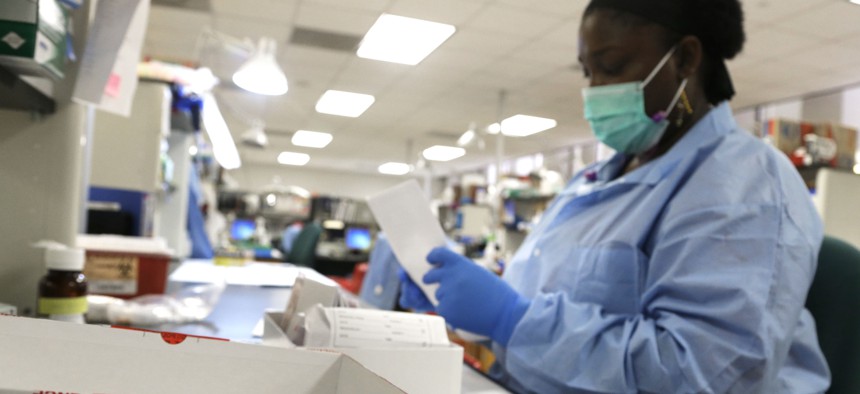Cities and States Continue to Face Challenges with Rape Kit Backlogs

A forensic analyst works on evidence in a sexual assault case in the biology lab at the Houston Forensic Science Center. Pat Sullivan/AP
With untested rape kits sometimes numbering in the thousands, local crime labs are struggling to solve cold cases with little funding and tackle a slew of active cases that also require investigation.
In attempting to clear a backlog of 6,838 untested rape kits, Wisconsin’s crime labs delayed DNA testing in around 350 active cases, a report released this week found. Since 2016, when the push to clear the backlog began, crime lab technicians have spent over 4,850 hours testing 4,160 of the kits, taking up about half of the state labs’ analyst capacity.
Wisconsin isn’t alone, explained Ilse Knecht, the director of policy and advocacy at the Joyful Heart Foundation, a survivor’s advocacy group. “A lot of places will send their backlogged kits to private vendors, because they don’t have the capacity to test old kits and DNA from new cases,” Knecht said. “They’re trying to eat an elephant one bite at a time, so something has to give.”
Across the country, states and cities are struggling with seemingly endless backlogs of untested rape kits from cases that may be decades old at this point. There are an estimated 225,000 kits waiting in storage across the country.
While many jurisdictions have focused on tackling those backlogs in recent years, there often isn’t enough money to test all of the kits, which are collections of evidence taken by nurses or other health professionals as part of an invasive exam that many survivors of sexual assault believe will help solve their cases. And there can be unintended consequences, like the one in Wisconsin, where newer cases might take longer to be analyzed because of the ongoing backlog effort.
But Knecht said that going through the old cases is crucial, and most law enforcement leaders have realized that. She said her organization has had to do much less convincing recently about the necessity of testing backlogged kits.
“It’s to the point now that this is undeniably the right thing to do. You can solve cases that never would have otherwise been solved, and states are picking up on that,” she said.
Knecht also noted that many sex crime units are understaffed, overwhelmed, and underfunded. Each kit costs between $1,000 to $1,500 to test, and states looking for funding sometimes turn to the federal government, which runs the Sexual Assault Kit Initiative. The grant program under the Department of Justice program has so far provided more than 50 jurisdictions with funding to test backlogged kits and create teams that can investigate and prosecute crimes based on new DNA evidence.
In addition to funding challenges, different policies across police departments also make evidence testing difficult for state crime labs. North Carolina has the most untested kits of any state at 15,000, and has no statewide standard on which cases should be prioritized. As a result, individual cities may clear their backlog while others do nothing. At a press conference last week, North Carolina Attorney General Josh Stein remarked that Durham, with 1,700 untested kits, is now leading the charge for the state by “moving kits off of the shelves, where they do us no good, and into the evidence analysis process, where we can eventually solve crimes.”
The phrase “eventually solve crimes” was never more appropriate than last year, when one tested kit found evidence for a North Carolina rape case that had been unsolved for 47 years.
But while North Carolina has an idea of just how hard their backlog will be to overcome, in other places, the number of untested kits is still unknown. The Texas legislature approved a bill this legislative session to require the Department of Public Safety to create an inventory of all untested kits and then provide them with $50 million to analyze the backlog. As Rep. Victoria Neave, the bill’s sponsor, spoke on the House floor, she pleaded with her fellow lawmakers to see the urgency of the situation. “In Texas, we have thousands of rape kits sitting on shelves waiting to be tested,” Neave said. “We have thousands of survivors waiting for justice.”
Knecht said that about half of states have laws that mandate the testing of rape kits, but in other places, it comes down to the decision of an individual investigator, which Knecht called “an alarming state of affairs.” For that reason, Knecht said that she hopes that the remaining states will also enact mandatory testing laws.
One state is also experimenting with advanced technology. Kentucky police last month announced that they would be testing rape kits with a relatively new process called rapid DNA testing that gives results in about two hours.
But for states and cities without such technology, there is still hope. Philadelphia last month cleared their 1,574 kit backlog spanning back to the 1980s. At a press conference, Assistant District Attorney Branwen McNabb said that the city will now analyze all new kits within 90 days, and thanked the scientists, police, and advocates who provided "closure and justice” for survivors.
Looking to the future, Knecht is optimistic that other local governments will follow Philadelphia and Kentucky’s leads in trying new technologies and persevering to end their backlogs. “We can take a picture of the inside of a black hole, so we should be able to test rape kits faster,” she said.
Emma Coleman is the assistant editor for Route Fifty.
NEXT STORY: FirstNet adds cell sites in West Virginia, Wisconsin's Red Cliff Reservation






